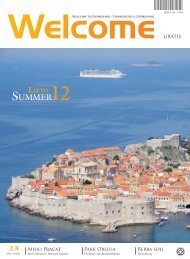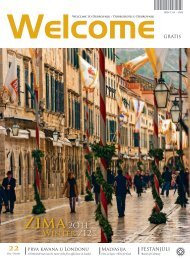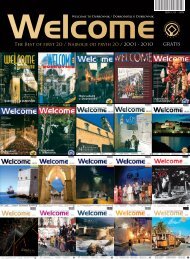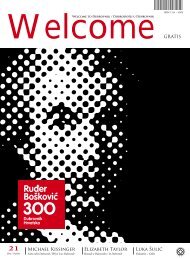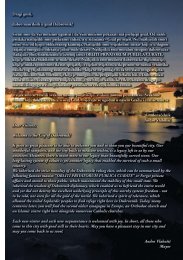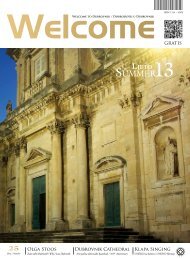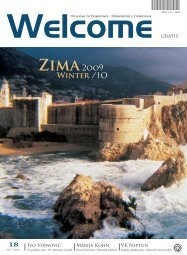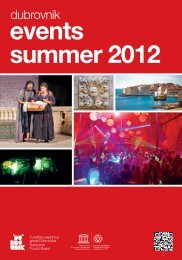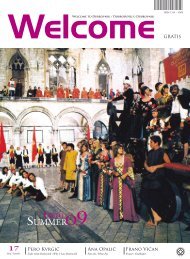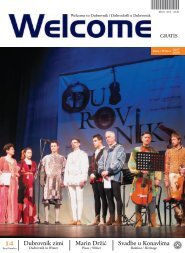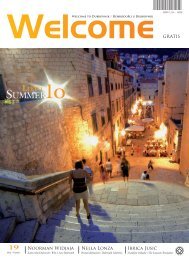24. Welcome to Dubrovnik - TuristiÄka zajednica grada Dubrovnika
24. Welcome to Dubrovnik - TuristiÄka zajednica grada Dubrovnika
24. Welcome to Dubrovnik - TuristiÄka zajednica grada Dubrovnika
Create successful ePaper yourself
Turn your PDF publications into a flip-book with our unique Google optimized e-Paper software.
A Souvenir and Something To be Proud of<br />
The Statute of<br />
<strong>Dubrovnik</strong> of<br />
translated in<strong>to</strong> the English language<br />
A<br />
recent publication<br />
by the <strong>Dubrovnik</strong><br />
State Archives<br />
entitled The Statute of <strong>Dubrovnik</strong> of<br />
1272 – includes an English translation<br />
alongside the Latin text, introduc<strong>to</strong>ry<br />
analyses The Statute of <strong>Dubrovnik</strong> of 1272:<br />
Between Legal Code and Political Symbol<br />
by Nella Lonza and The Language in<br />
the Medieval Manuscripts of the Statute<br />
of <strong>Dubrovnik</strong> by Vesna Rimac, and a<br />
Glossary with explanations of special<br />
terms. It is the result of many years’<br />
effort by a number of experts, starting<br />
with Vesna Rimac’s demanding<br />
translation from Medieval Latin<br />
in<strong>to</strong> English, through Vesna Baće’s<br />
comprehensive terminological research<br />
and polishing up of style, <strong>to</strong> my legal<br />
explanations of unclear passages and<br />
edi<strong>to</strong>rial coordination.<br />
The point of translating medieval<br />
statutes in<strong>to</strong> modern languages is based<br />
on the belief that they are not silent<br />
witnesses <strong>to</strong> an ancient time - with<br />
which only connoisseurs of the code<br />
of the his<strong>to</strong>ry of law can communicate<br />
– but that they can convey inspiring<br />
thoughts about law and social values<br />
<strong>to</strong> anyone who is interested, and tell of<br />
identity, tradition and bygone times.<br />
Today the English language<br />
is what Latin once used <strong>to</strong> be – the<br />
universal language of all educated<br />
people. Therefore, the aim of this<br />
translational edition is <strong>to</strong> remove the<br />
unnatural language barrier which the<br />
modern age has put up between us and<br />
our heritage.<br />
The Statute of <strong>Dubrovnik</strong><br />
represented the foundations of the legal<br />
system for more than five centuries<br />
(1272-1808), having become a powerful<br />
symbol of <strong>Dubrovnik</strong>’s collective<br />
identity and statehood. It contained all<br />
elements typical of local circumstances.<br />
For instance, it was cus<strong>to</strong>mary that the<br />
Rec<strong>to</strong>r presented a gift of money <strong>to</strong> the<br />
first ship which sailed in<strong>to</strong> the Port of<br />
<strong>Dubrovnik</strong> at Easter or Christmas. It<br />
also included legal measures derived<br />
from contact with the nearby Croatian<br />
provinces and Slavic countries in the<br />
hinterlands, such as the stanak (a kind<br />
of international arbitration). Some<br />
institutes and terms reveal Byzantine<br />
influence, while others clearly show<br />
signs of Venice’s supreme authority at<br />
the time when the Statute was written.<br />
Most important among all<br />
these different elements is a threefold<br />
tradition: the urban culture of the<br />
Mediterranean cities, the principles of<br />
prudent administration articulated in<br />
the political thought and practice of<br />
the thirteenth century, and primarily,<br />
the rich European legal heritage which<br />
in the Middle Ages developed on the<br />
legacy of Roman and canon law.<br />
However, the Statute of<br />
<strong>Dubrovnik</strong> is not merely a legal code.<br />
There is no other written evidence from<br />
the thirteenth century that tells so much<br />
about the institutions, society, family<br />
relationships, trade, urban development,<br />
and many aspects of everyday life as<br />
the Statute does. It portrays a time<br />
when most of the houses in <strong>Dubrovnik</strong><br />
were made of wood and when theft was<br />
punished by death, but also tells of the<br />
<strong>Dubrovnik</strong> seamen who bought and<br />
sold fabrics from Florence and Verona,<br />
Arras and Ypres, and from Stamford, as<br />
well as expensive Byzantine textiles and<br />
the local coarse cloth.<br />
Although not an easy reading<br />
in modern translation either, the Statute<br />
of <strong>Dubrovnik</strong> is a colourful source of the<br />
everyday life of a medieval city in the<br />
Mediterranean and an ideal companion<br />
<strong>to</strong> the early centuries of European legal<br />
culture.<br />
12 Dobrodošli u <strong>Dubrovnik</strong> Zima 2012./13.



